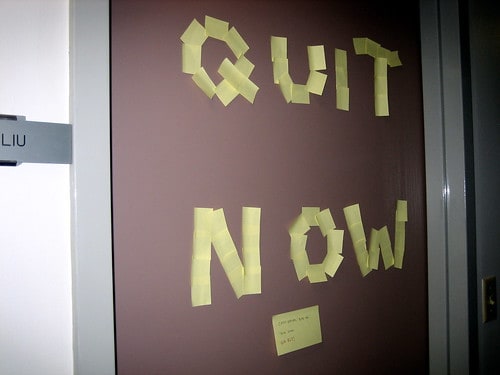How much is your time worth?
Did you see the Justin Timberlake thriller In Time last year? Probably not. Nobody else did either. Well, I did, I guess. And while the movie wasn't very good, it contained an interesting idea that I think relates to personal finance.
The movie's plot revolves around a world where everyone is genetically engineered to live until they're 25. After that, they have exactly one year left before they die. The amount of time they have left to live is displayed on their forearm and because of how limited of a resource it is, people use time as the method to barter and exchange things with each other. Time becomes a currency. Want a cheeseburger? That's twenty minutes. Bus fare? Two hours. You get the picture.
If you can get past some overly-cheesy acting moments from Justin Timberlake, the movie makes an interesting point about the importance of valuing your time. While it's easy to waste five minutes here and there in your day-to-day life without realizing it, in the movie people are acutely aware of just how much time they have left. It's marked on their forearm after all, and they weigh all of their decisions on whether or not the trade-off is literally worth their time.
Can’t get a job? Get a microjob!
Looking for work? Somebody out there wants you to design websites, board dogs, run errands, write blot posts, do laundry, deliver packages, be a virtual assistant.
Sites like eLance, TaskRabbit, Fiverr, 99designs and 3to30.com are virtual employment offices offering gigs you can pick up and put down as needed. Sometimes you bid on jobs and sometimes you post your own ad, whether serious or offbeat. (“I will create a lacrosse trick and name it after you.”)
Whether you call this consulting, freelance or “microjobs,” more of us are headed that way, according to Kristin Cardinale. The author of The 9-to-5 Cure, Cardinale cites U.S. Department of Labor projections that “millions of short-term workers” are needed.
Shor
Burgers or Blogging? Further Thoughts on Pursuing Your Passion
Over the past couple of weeks, we've been exploring the nature of work at Get Rich Slowly. What does it mean to pursue your passion? Is passion what work should be about? Or is a job just a source of income?
For me, there's no right answer.
Right now, yes, I'm pursuing my passion, and I love it. As a full-time writer working from home, I'm doing work I've always wanted to do, and I do it on my own schedule. Yet I recognize this isn't what everyone wants. Kris, for instance, loves her job and her co-workers. She finds the work fulfilling, and she likes the security of having an employer take care of things like taxes, paychecks, and health insurance.
How to negotiate your salary

One of my goals for GRS in 2012 is to write more about earning money.
I quit my job a year-and-a-half ago to become self-employed, but I know that most people are employees, and I'm the last person who would suggest that everyone should quit their jobs and become full-time freelancers. For one thing, it's not right for everyone. It can be lonely, and it doesn't come with medical benefits, which some people need, especially those who can't get individual insurance at a reasonable cost. Depending on your career, it might not even be possible (never heard of a self-employed police officer, for example). And some people want to put in their time and leave work at work at 5 p.m., or just plain enjoy their job.
There are a lot of reasons why it makes more sense to be an employee, which is why I don't plan to only write about starting a side business or freelancing (although I do plan to cover those topics), but also how employees can earn more at their current job and make savvy career moves.
Dealing with office politics: How to win the office politics game
"Office politics" is one of those phrases that used to make me groan. I worked in an office from the time I was a freshman in college until I quit my job last year, and let me tell you, I had my fill. I dealt with situations that would make our presidential candidates wince, and I tried many approaches to deal with it, such as pretending to be completely oblivious to it (a very bad idea, by the way).
But I had one boss, the best manager I've ever had, who was great at the game. She's the one who taught me how to do things like keep a brag folder and remind a senior manager 10 different ways that she still hadn't approved a proposal. In fact, she was so diplomatic and professional that one of the only "negative" things I heard about her was "she gets along with everyone." (Yes, she was being bad-mouthed for not taking sides.)
I learned many valuable lessons from this manager, and I came away with a much different understanding of office politics.
How to Know When to Quit

After a year or two, it got harder to get up in the morning and face an eight-hour day of doing whatever it was I was hired to do. By years three to five, the shine was wearing off, and finally it was clear that I needed to quit my job. I'd tried to make proactive changes, but it was time to move on.
Winners never quit?
This move-on point is what bestselling author Seth Godin calls a cul-de-sac in his book The Dip: A Little Book that Teaches You When to Quit (and When to Stick). He says when you hit a cul-de-sac (French for "bottom of the bag," meaning "dead-end"), it's time to quit. This sort of advice is quite unlike the winning and failing quotes we hear so often in our society, such as:
How to Ask for a Raise in a Bad Job Market
The best time to ask for a raise is just after a stellar performance review because your boss will be anticipating it. If you've just been promoted or received new responsibilities that are typically associated with a higher-level position, it's always appropriate to broach the subject of a salary increase even in a difficult market.
But how do you ask for a raise? Here are some of my top tips:
- Before the meeting takes place, role-play it with a friend so that you can practice a tone that sounds friendly and assertive rather than bitter and entitled.
- If you can, try for an informal setting like coffee.
- Once you sit down with your manager, start positively. You might, for example, say something like: “I've gotten so much out of working here and really appreciate you mentorship and the opportunities you've given me.”
- Then, ask if she'll consider a salary increase in light of your recent performance. You might lead off with: “Now that I've been doing the work of a senior account manager for almost a year, can we consider an increase in compensation to reflect these new responsibilities?”
- As clearly and concisely as possible, go over the highlights with some concrete examples. Focus on the benefits your boss and the company receive from your contributions rather than the additional money you need or desire.
For example, you should say something like: “Because I can do the job of both an account manager and a programmer, I'm saving the company an additional salary” rather than: “I need to be making more income to pay for my wedding next year.” And don't bring co-workers into the discussion by saying: “Well, Peter Gibbons has only been working here a few months and I know he's making way more than me.”
If y
10 career lessons from Julia Child


Readers, I hope you'll forgive me for writing another culinary-themed post here at Get Rich Slowly. Last week I wrote about the expense of healthy food cooked at home, and this week I can't help but to talk about something that's been on my mind as I've read My Life In France by Julia Child and Alex Prud'Homme.
My Life in France chronicles Julia Child's life from the year she arrived in France in 1948, knowing nothing about the French culture or language, nor the cuisine she would so famously present to to America in her ground-breaking cookbook, Mastering the Art of French Cooking, and her television show, The French Chef.
Jump-start your career with a personal business model
In columns past, Get Rich Slowly has showed you how to improve your financial situation by thinking of yourself as a business. In short, the lessons of business often apply to personal life. I recently discovered this while editing a book about business models that turned into an international bestseller. (Who knew business models could be so popular?) The lesson I learned — that business model thinking can apply to individuals as well as to organizations — could help you jump-start your career.
The term “business model” may seem like jargon used by high-priced consultants and business-school professors. That's too bad, because understanding and analyzing business models remains a rare and valuable skill — yet one anybody can learn.
What does “business model” mean, anyhow? There's little agreement on a precise definition, but two common explanations are “a blueprint for a business” and “how a firm makes money.” These definitions are general and don't mean exactly the same thing. Still, both suggest that business models play a key role in business success.
Why is this im
What to do with an old 401(k)
When a friend of mine changed jobs recently, she discovered she had half a dozen old 401(k)s trailing her from her past jobs. She wanted to get on top of her financial planning, but wasn't sure what to do with all those old investments. she asked me for advice.
Truth is, I wasn't sure either. I cashed out my one 401(k) to buy a house several years ago. I know that was a dumb move in the larger financial story of my life. Saving early for retirement is one of the best ways to build wealth. I can't undo it now, though, and I've been so focused on paying off debts I haven't thought much about retirement planning for years.
As my debt burden shrinks, it's time to start thinking about my own investment strategy. So I looked into my friend's question: What should she do with those old 401Ks?